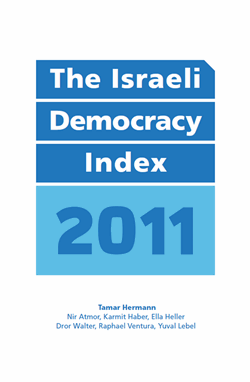The Israeli Democracy Index 2011
- Written By: Prof. Tamar Hermann, Nir Atmor, Karmit Haber, Ella Heller, Dror Walter, Dr. Raphael Ventura, Yuval Lebel
- Publication Date:
- Cover Type: Ebook
- Center: Viterbi Family Center for Public Opinion and Policy Research
The Israeli Democracy Index 2011 provides an up-to-date, theoretical and practical portrait of opinions held by Israelis regarding the preferred form of government, functioning of the political system, behavior and performance of elected officials and key democratic values. Israel’s stability as a democracy is reflected in this year’s results, not only in many of the opinions on various issues presented, but also in Israel’s status according to international indexes.
The Israeli Democracy Index 2011, the product of research conducted by the Israel Democracy Institute's Guttman Center, aims, like Indexes of previous years, to sketch a theoretical and practical portrait of opinions held by the population of Israel – as a whole and its various subgroups – regarding all that concerns preferred form of government, functioning of the political system, performance and behavior of elected officials and key democratic values. The Index also attempts to identify representations of undemocratic and anti-democratic thought and action that require attention through education and inculcation of values or – in extreme cases – enforcement. The data were gathered in March 2011 by the Dahaf Institute, headed by Dr. Mina Zemach, from a nationwide representative sample of 1,200 adult Israeli citizens (aged 18 and up).
Principal findings
- National Solidarity: 82.3% of respondents say they are proud to be Israeli (including more than half the Arab citizens interviewed). 78% are convinced that they want to live in Israel in the long run, although the percentage is lower among young adults than among the older age groups. 69.5% feel they are part of the State of Israel and its problems. The public ranks the solidarity of Israeli society as a whole as moderate, with an average score of 4.8 out of 10. The average solidarity score for Jewish Israeli society is slightly higher (5.8). Paradoxically, Arab citizens ascribe greater internal solidarity to Jewish Israeli society than do the Jewish citizens.
- Quality of Democratic Performance: 52.3% believe that Israeli democracy works well, although the remainder, about half, is dissatisfied. Pockets of dissatisfaction were discovered among young adults, the ultra-Orthodox and Arabs. 71.5% are dissatisfied with the government's handling of state problems.
- Preferred Form of Government: This year, 32.4% declared that the best form of government was a strong leader who does not have to take elections into account; 82.9% consider representative democracy to be best.
- Elected Officials and Their Constituents: Only a third agrees that most Knesset members are doing a good job; 70.6% believe that politicians primarily look out for their own interests; 43.1% also believe that you have to be corrupt to reach the top in Israeli politics.
- National Goals: The Jewish population considers narrowing of socioeconomic gaps to be the State of Israel's primary goal, immediately followed by strengthening Israel's military capability. The Arab population accords achieving peace with the Palestinians top priority, followed by improving relations between Arab and Jewish citizens.
- "Jewish and Democratic": Among the Jewish population, 46.1% prefer this combined definition of the State of Israel; 29.5% emphasize the "Jewish" component and only 22% the "democratic" one.
Halakhah (Jewish religious law) vs. Democracy: In the event of a conflict, 49.7% of the Jewish population believes that preference should be given to upholding democratic principles, while 21% prefer observing the tenets of Jewish law and 26.5% say that each issue should be judged separately. - Interest in Politics: Contrary to prevailing opinions, young adults are only slightly less interested in politics than older ones (71.2% vs. 81%, respectively), although the former discuss political issues much less than the latter.
- Sources of Political Information: The media, especially television, constitute the primary source of political information for all sectors of the Israeli public. The Internet still plays only a secondary role, even among young adults.
- Relations between Jews and Arabs: Only about two thirds of the Jewish population considers Arab citizens to be "Israelis"; 77.9% of Jews support excluding the Arab population from decision-making processes – not only concerning peace and security but also on socioeconomic issues and form of government (69.5%); 52.5% even reject the claim that Arab citizens of Israel are discriminated against.
- Freedom of Expression and Academic Freedom: 50.8% of Israel's population agrees with the statement that speakers should be prohibited from harshly criticizing the State of Israel in public; a majority of the Jewish population (57.8%) believes that university lecturers should not be permitted to express political opinions in their courses. More than half the Jews (62.9%) even maintain that the state should oversee the content of university courses.
- "The State of Tel Aviv": Israel's population is evenly divided on the question of whether there indeed exists an isolated "State of Tel Aviv" whose residents are not eager to fulfill their obligations as citizens; young adults, Arabs, right wingers and traditional, Orthodox and ultra-Orthodox Jews display higher than average rates of concurrence with the claim that there is such a "State."
- Foreign Workers: 56.9% believe that foreign workers should not be considered Israelis, but 53.5% do consider their children who grew up here to be Israeli; one third blames foreign workers for problems of unemployment and a lack of reasonably priced housing, with even higher rates of concurrence with this contention among Arabs, the ultra-Orthodox and those who place themselves on the margins of society.
Israel Compared with Other Countries: Israel ranks at or near the middle of the scale for most international democracy indexes this year, standing out positively for its place on the Political Participation Index and negatively for its place on the Electoral Process and Pluralism Index, Civil Rights Index, Freedom of Religion Index and especially the Religious Fractionalization Index.

